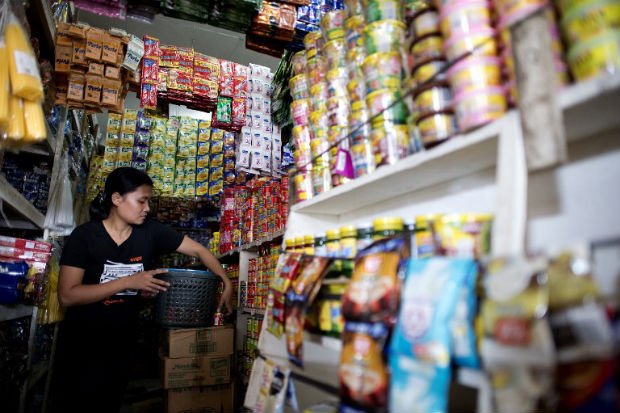‘Yolanda’ widow grateful for cruel consolation

In this picture taken on October 15, 2014, Philippine typhoon widow Jennifer Pulga shops for items to be sold in her small store in San Agustin, Leyte. Jennifer’s husband, Richard, was among the more than 7,350 people who perished when Super Typhoon Haiyan, one of the strongest storms on record, razed dozens of farming and fishing communities in the central Philippines. AFP PHOTO/NOEL CELIS
SAN AGUSTIN – A tiny store selling lollies, coffee and shampoo may seem a cruel consolation for Philippine typhoon widow Jennifer Pulga, but it keeps her with her children and for that she is deeply grateful.
Jennifer’s husband, Richard, was among the more than 7,350 people who perished when Super Typhoon “Yolanda” (international name: Haiyan), one of the strongest storms on record, razed dozens of farming and fishing communities in the central Philippines.
The couple lived in an isolated farming village and Richard, 27, was badly injured after winds exceeding 300 kilometers (185 miles) an hour tore down a coconut tree, crashing it into their bamboo house and on top of him.
Jennifer took six days to get him to a hospital but the facility was badly damaged and had no electricity, so medics could only amputate a damaged leg and give her a hand pump to manually inflate his collapsed lungs.
Jennifer pumped Richard’s lungs for six hours, hoping for a miracle.
Article continues after this advertisementThen he died, leaving her with a baby daughter and six-year-old son but no way to support them.
Article continues after this advertisementJennifer did not want to return to the farm and could not have done so if she did, with their home and all the coconut trees that had given them a meager income destroyed in the storm.
Three months after the disaster, Jennifer was living with her elderly mother-in-law, herself a widow, in a tiny mountain village close to where she had lived with Richard.
The mother-in-law’s house was made of solid concrete bricks, but the roof was badly damaged in the typhoon and still in need of repair.
With no income, the four of them survived on aid from local and international charity groups.
But the aid in such a remote village was much less than in more heavily populated areas impacted by the typhoon, and it was about to run out.
“I was going to have to leave my children and work as a maid somewhere,” Jennifer, 28, told AFP on a recent visit.
“But I needed to stay with my children. I needed to protect them. There is just the three of us now, so they mean so much to me.”
She had grown up poor in the countryside and her only previous work experience outside of the farm was a short stint as a maid in the nations’ capital, Manila.
Luck turns
Finally, with that prospect looming, Jennifer’s luck changed.
A Filipino living in the United States read an article about Jennifer and sent her P21,000
($470) to set up a small store outside her mother-in-law’s home.
“I prayed to God that somebody would give us help,” said Jennifer, who like most Filipinos is a devout Catholic.
“If we didn’t have any help, we wouldn’t have anything. So this is really an answered prayer.”
The store is barely bigger than a dog kennel, with the roof just a tarpaulin sheet donated nearly a year ago from an international aid group.
The products on offer are fewer and with less variety than others in the village.
But Jennifer earns an average of about 50 pesos ($1.2) dollars a day from the store, selling lollies to children and sachets of coffee, shampoo and other household items to her neighbors.
“This means so much to me because I can support my children, we are earning enough for our daily expenses,” Jennifer said.
The store has not been a panacea for grief.
“Every night I dream of Richard, and I am so sad. I lie in bed and cry,” Jennifer said, with tears in her eyes and her 14-month-old daughter, Irish, on her knee. “Sometimes I feel I am going crazy.”
The tragedy has also tested her faith, with gratitude for the stall occasionally turning to anger and pity.
“Sometimes I talk to God. I tell Him: ‘Maybe you don’t love me, because you took Richard away from us’,” she said.
“And sometimes I ask myself why it has happened to us. We who are already so poor. But it is not only me who has suffered. There are so many others.”
Yet , looking after the store helps to distract her from these dark moments, particularly the half-hour weekly trek to the nearest town to buy supplies.
“I’m enjoying being a businesswoman,” Jennifer said, a rare smile emerging.
More good news arrived last month when a French aid group, which similarly read about Jennifer’s story on the Internet, sent the equivalent of $1,000 (45,000 pesos) to fix her mother-in-law’s house.
The combined donations are extraordinary in a region where hundreds of thousands of typhoon survivors are enduring similar poverty without any financial aid.
Still the money offers no long-term financial miracles and her shop is the most fragile of lifelines.
“I don’t know what we would do without it,” she said.